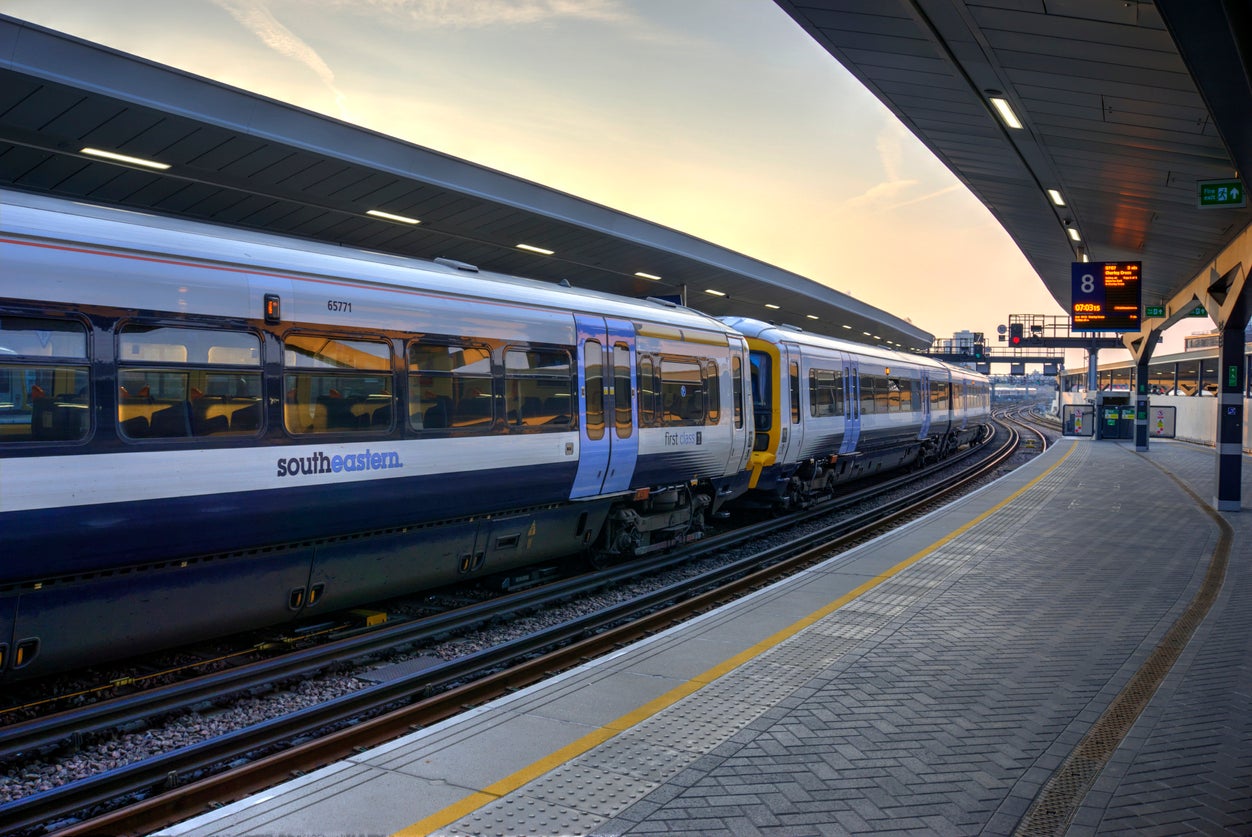Train passengers in the southeast could be hit with higher rail fares after super off-peak tickets axed
Travellers will also see changes to off-peak timings, affecting travel on both weekdays and weekends

Your support helps us to tell the story
From reproductive rights to climate change to Big Tech, The Independent is on the ground when the story is developing. Whether it's investigating the financials of Elon Musk's pro-Trump PAC or producing our latest documentary, 'The A Word', which shines a light on the American women fighting for reproductive rights, we know how important it is to parse out the facts from the messaging.
At such a critical moment in US history, we need reporters on the ground. Your donation allows us to keep sending journalists to speak to both sides of the story.
The Independent is trusted by Americans across the entire political spectrum. And unlike many other quality news outlets, we choose not to lock Americans out of our reporting and analysis with paywalls. We believe quality journalism should be available to everyone, paid for by those who can afford it.
Your support makes all the difference.Passengers in the southeast of England could be hit by higher rail prices after five train operators abolished super off-peak fares and changed off-peak hours.
The operators have restructured their fares and removed the cheapest tickets, while setting new evening peak hours of 4pm until 7pm between Monday and Friday. These hours apply to anyone travelling from or via a station in London Zones 1 to 9.
Some 53 stations will be affected across London and the southeast, and changes include adjustments to single-leg fares which make them exactly half the price of a return – previously, return journeys were only marginally more expensive than singles.
The companies involved are Chiltern, c2c, Southeastern, South Western Railway and London Northwestern Railway. In addition, some Thameslink services will be affected if they travel through stations operated by Southeastern.
Passengers who travel into the capital on off-peak services but return between 4pm and 7pm will no longer be able to use an off-peak day return ticket, but off-peak day travelcards will still be valid after 9.30am.
The removal of super off-peak fares will mainly affect those journeying around London on weekends.
The changes are part of a government initiative to simplify fares and introduce more ‘Pay As You Go’ (PAYG) options for travellers around the capital.
The companies said that “the government’s plan to introduce pay-as-you-go contactless ticketing across a further 50 stations in the southeast outside the capital had been delayed until the spring”, reports The Times.
A spokesperson for the Rail Delivery Group, who represent the relevant companies on the matter, said: “Customers have told us they want fares that reflect their needs and are simple to use. The way our customers buy tickets is changing, and the expansion of pay as you go with contactless announced earlier this year by the Department for Transport is a step in the right direction providing convenience, simplicity and flexibility.
“In order to do this, from 3 December train operators are having to make some changes to the fares in preparation for the introduction of pay as you go with contactless.”
Train companies defended the changes, highlighting that they are part of a government initiative. Rob Mullen, managing director of c2c, said: “The introduction of simple and easy-to-understand fares and peak travel times will make searching and buying tickets easier and more straightforward for our customers.
“Moving forward, all of our ticketing products – Smartcards, traditional paper, e-tickets and contactless pay as you go (when launched) – if purchased on the day of travel, will offer fares at the same price. Removing the barriers to rail travel remains a priority to the team at c2c.”
Michael Roberts, chief executive of London TravelWatch, the capital’s transport watchdog, said that they are “fully behind the idea of simplifying the fares system and travel options for rail passengers, but we’ve not seen much publicity about these changes and are concerned that public awareness may be very low.
“We don’t want people to get caught out so we’re encouraging passengers to check to see if their journey will be affected. For example, some tickets have had to be phased out completely, including the super off-peak option. This will mean that some journeys may actually cost more.”
For those planning travel in these areas, National Rail advice states that “depending on the day and time of your journey, it may be better value to buy two single tickets rather than a return ticket. For example, if you make a peak journey in one direction and an off-peak journey in the other, then an anytime single plus an off-peak single will be cheaper than an anytime day return”.
The Independent has contacted the relevant train operators for comment.



Join our commenting forum
Join thought-provoking conversations, follow other Independent readers and see their replies
Comments